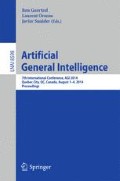Abstract
Because advanced AI is likely in the future, so is the possibility of multiple advanced AIs. It is therefore also likely that such advanced AIs will be implemented in software that can be copied from hardware to hardware. The best existing theoretical framework for the rigorous formal treatment and prediction of such AIs are those based on the AIXI framework developed by Hutter [2]. Unfortunately, these single-agent frameworks do not allow formal treatment of multiple co-existing AIs. The current paper introduces a novel “multi-slot” framework for dealing with multiple intelligent agents, each of which can be duplicated or deleted at each step, in arbitrarily complex environments. The framework is a foundational first step in the analysis of environments that allow creation (by copying) and deletion of multiple agents. Even by focusing on the case where the agents do not interact, the notion of future of an agent is not straightforward anymore, so we propose several such definitions, leading to value functions and AIXI-like agents. Finally, the framework is shown to be sufficiently general to allow for the existence of a universal environment that can simulate all environments in parallel. A companion paper uses the multi-slot framework presented here to explore the notion of identity in man and machine.
Access this chapter
Tax calculation will be finalised at checkout
Purchases are for personal use only
Preview
Unable to display preview. Download preview PDF.
References
Ferber, J.: Multi-agent systems: An introduction to distributed artificial intelligence, vol. 1. Addison-Wesley, Reading (1999)
Hutter, M.: Universal Artificial Intelligence: Sequential Decisions based on Algorithmic Probability. Springer (2005)
Hutter, M.: Open problems in universal induction & intelligence. Algorithms 3(2), 879–906 (2009)
Hutter, M.: Observer localization in multiverse theories. In: Proceedings of the Conference in Honour of Murray Gell-Mann’s 80th Birthday, pp. 638–645. World Scientific (2010)
Lattimore, T., Hutter, M.: Time Consistent Discounting. In: Kivinen, J., Szepesvári, C., Ukkonen, E., Zeugmann, T. (eds.) ALT 2011. LNCS (LNAI), vol. 6925, pp. 383–397. Springer, Heidelberg (2011)
Li, M., Vitanyi, P.: An Introduction to Kolmogorov Complexity and its Applications, 3rd edn. Springer (2008)
Orseau, L.: Teleporting universal intelligent agents. In: Goertzel, B., et al. (eds.) AGI 2014. LNCS (LNAI), vol. 8598, pp. 110–121. Springer, Heidelberg (2014)
Orseau, L., Ring, M.: Self-Modification and Mortality in Artificial Agents. In: Schmidhuber, J., Thórisson, K.R., Looks, M. (eds.) AGI 2011. LNCS (LNAI), vol. 6830, pp. 1–10. Springer, Heidelberg (2011)
Orseau, L., Ring, M.: Memory issues of intelligent agents. In: Bach, J., Goertzel, B., Iklé, M. (eds.) AGI 2012. LNCS (LNAI), vol. 7716, pp. 219–231. Springer, Heidelberg (2012)
Orseau, L., Ring, M.: Space-time embedded intelligence. In: Bach, J., Goertzel, B., Iklé, M. (eds.) AGI 2012. LNCS (LNAI), vol. 7716, pp. 209–218. Springer, Heidelberg (2012)
Parfit, D.: Reasons and Persons. Oxford University Press, USA (1984)
Ring, M., Orseau, L.: Delusion, Survival, and Intelligent Agents. In: Schmidhuber, J., Thórisson, K.R., Looks, M. (eds.) AGI 2011. LNCS (LNAI), vol. 6830, pp. 11–20. Springer, Heidelberg (2011)
Russell, S.J., Norvig, P.: Artificial Intelligence. A Modern Approach, 3rd edn. Prentice-Hall (2010)
Schmidhuber, J.: Ultimate cognition à la Gödel. Cognitive Computation 1(2), 177–193 (2009)
Schmidhuber, J.: The fastest way of computing all universes. In: A Computable Universe: Understanding and Exploring Nature as Computation, pp. 381–398. World Scientific (2012)
Solomonoff, R.: Complexity-based induction systems: Comparisons and convergence theorems. IEEE Transactions on Information Theory 24(4), 422–432 (1978)
Sutton, R., Barto, A.: Reinforcement Learning: An Introduction. MIT Press (1998)
Zvonkin, A.K., Levin, L.A.: The complexity of finite objects and the development of the concepts of information and randomness by means of the theory of algorithms. Russian Mathematical Surveys 25(6), 83–124 (1970)
Author information
Authors and Affiliations
Editor information
Editors and Affiliations
Rights and permissions
Copyright information
© 2014 Springer International Publishing Switzerland
About this paper
Cite this paper
Orseau, L. (2014). The Multi-slot Framework: A Formal Model for Multiple, Copiable AIs. In: Goertzel, B., Orseau, L., Snaider, J. (eds) Artificial General Intelligence. AGI 2014. Lecture Notes in Computer Science(), vol 8598. Springer, Cham. https://doi.org/10.1007/978-3-319-09274-4_10
Download citation
DOI: https://doi.org/10.1007/978-3-319-09274-4_10
Publisher Name: Springer, Cham
Print ISBN: 978-3-319-09273-7
Online ISBN: 978-3-319-09274-4
eBook Packages: Computer ScienceComputer Science (R0)

